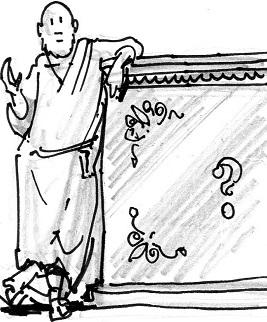
“What you unknowingly worship, I proclaim to you" (Acts 17:24).
Acts 17:15, 22—18:1; Jn 16:12-15
Many surveys reflect a sharp increase of Americans who say they are unaffiliated with any church. Over a third of young adults reportedly self-identify in this category. All mainline Christian denominations have lost ground, including Catholics. Many of the unaffiliated say they are atheists or agnostics.
The surveys only speculate on reasons for the drop in formal membership, but the failure of mainline Christianity to attract and hold young people is an acknowledged factor. This speaks to a shift in culture and the perception by many seekers that formal religion has not offered real meaning and purpose or modeled an effective way to address social justice problems and people's personal questions.
In today's reading from Acts, St. Paul is visiting the hilltop in Athens where shrines and statues identified deities popular among the Greeks. Greek thinkers were known for exploring basic questions of meaning. Paul's approach is to explain how "natural theology," represented by the Greek shrine to an "Unknown God," could lead to acceptance of an all-knowing creator by rational argument.
His erudite speech ends when he tells his audience that God revealed the truth by raising a Jewish man named Jesus from the dead. They laugh at Paul and most of them politely excuse themselves. Like the Romans, Greeks saw religion as merely a civic exercise in a secular culture, but they did not commit to personal faith beyond that.
The journey to faith has many thresholds and paths. The more experience people have, the more they understand how mysterious life is. Adversity teaches resilience; struggle exposes our hopes and fears; love teaches us values that go beyond this world and our own brief lives.
Jesus tells his disciples in today's Gospel that they have much to learn, but they cannot bear it all at once. Only with time and experience, and the help of the Holy Spirit, will they enter the deeper mysteries of self-sacrifice as the path to meaning and ultimately to glory.
Knowing little and believing less can paradoxically be a good place to start because the mind is not cluttered with easy assumptions. When we let Life itself be our teacher, it sets us on the road to faith by urging us to face our questions and problems honestly. A sincere heart and an open mind inevitably lead to the deepest questions about the source and purpose of our own existence.
This is when we begin to encounter the nameless God who knows us by name and loves us more than we can imagine.







